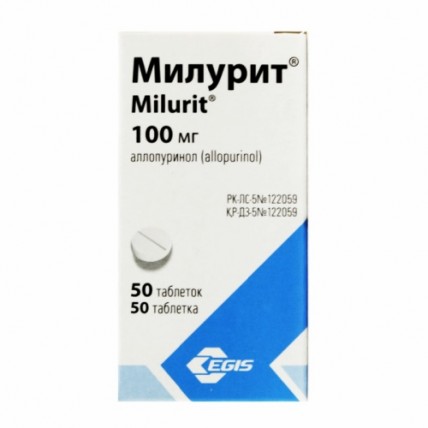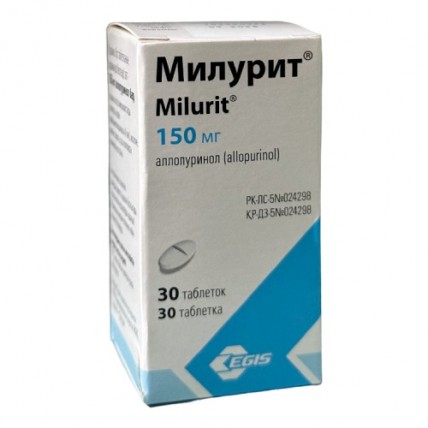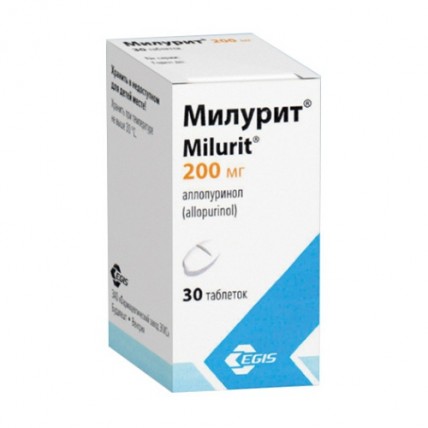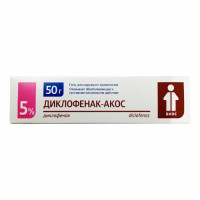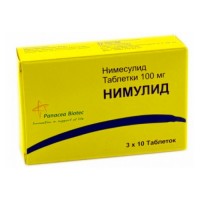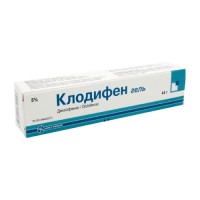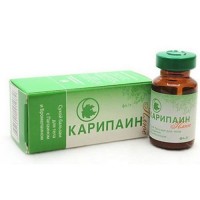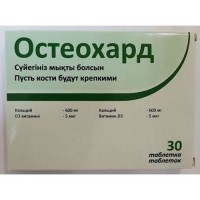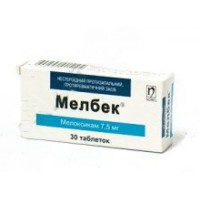Milurit® (Allopurinol) 100 mg / 150 mg / 200 mg
- $10.00
What is Milurit® (Allopurinol) and how does it work?
Milurit® (Allopurinol) is a medication used to treat conditions associated with elevated levels of uric acid, such as gout and kidney stones caused by the buildup of uric acid crystals.
The active ingredient, allopurinol, is a structural analog of hypoxanthine.
It works by inhibiting an enzyme called xanthine oxidase, which converts hypoxanthine and xanthine into uric acid.
By blocking this enzyme, allopurinol lowers uric acid levels in both the blood and urine.
This helps prevent the formation of uric acid crystals in the joints, kidneys, and tissues, or aids in their dissolution.
Additionally, oxypurinol, the main active metabolite of allopurinol, also inhibits xanthine oxidase.
By reducing purine metabolism, a larger amount of hypoxanthine and xanthine becomes available for the re-synthesis of purine bases, thereby inhibiting purine biosynthesis.
This comprehensive action not only lowers uric acid levels but also prevents complications such as crystal deposits in the tissues.
What are the dosages available for Milurit®?
Milurit® is available in 100 mg, 150 mg, and 200 mg tablet strengths. The choice of dosage depends on the specific condition being treated, the severity of the condition, and how well the patient responds to the medication over time.
- For mild cases (e.g., mild gout or hyperuricemia), the recommended dose typically ranges from 100-200 mg per day.
- In moderate cases (more severe hyperuricemia or gout with recurrent attacks), doses may range from 300-600 mg per day.
- For severe cases (e.g., chronic or tophaceous gout), doses can go up to 700-900 mg per day.
Dosage adjustments are often made gradually to ensure the medication is effective while minimizing side effects.
How should Milurit® be taken?
Milurit® is taken orally, usually once a day after meals. Taking it with food helps reduce the likelihood of gastrointestinal side effects, such as nausea or stomach upset. The medication should be taken with a large glass of water, and it's essential to maintain adequate hydration throughout treatment to help the kidneys flush out excess uric acid and prevent kidney stones.
For doses greater than 300 mg per day, it is often recommended to split the dose into two or more administrations throughout the day to reduce side effects.
For adults:
- Initial dose: 100 mg once daily. This can be increased depending on the patient's uric acid levels.
- Mild cases: 100-200 mg daily.
- Moderate cases: 300-600 mg daily.
- Severe cases: 700-900 mg daily.
For children:
- The dosage is based on body weight and is typically 10-20 mg per kilogram per day. The maximum daily dose for children should not exceed 400 mg and is usually divided into two or three doses per day.
What are the potential side effects of Milurit®?
While Milurit® is well-tolerated by many patients, side effects can occur. Common side effects include:
- Nausea, vomiting, and diarrhea.
- Skin rashes: One of the more frequent side effects that can vary in severity. If any rash appears, it is important to stop the medication and consult a doctor immediately.
- Drowsiness or feeling tired.
Rare but serious side effects include:
- Stevens-Johnson syndrome (SJS) or toxic epidermal necrolysis (TEN), which are life-threatening skin reactions. Symptoms include severe blistering, peeling skin, and fever. These require immediate discontinuation of the drug and urgent medical attention.
- Liver problems, which may manifest as abnormal liver function tests or jaundice (yellowing of the skin and eyes).
- Kidney issues, especially in people with pre-existing kidney conditions.
If any unusual symptoms or allergic reactions occur, it's crucial to consult a healthcare provider promptly.
Who should not use Milurit®?
Milurit® is contraindicated in individuals who have hypersensitivity (allergic reactions) to allopurinol or any other ingredients in the tablet formulation. Some key contraindications and precautions include:
- Pregnancy: Allopurinol should not be used during pregnancy unless absolutely necessary, as there is limited data on its safety in pregnant women.
- Breastfeeding: Allopurinol and its active metabolite, oxypurinol, can pass into breast milk. Therefore, it is recommended to avoid this medication during breastfeeding unless no safer alternatives are available.
- Children under 3 years old: The use of allopurinol in children younger than 3 is not recommended unless necessary for specific conditions such as certain enzyme deficiencies.
Patients with liver or kidney impairment should use this medication with caution and may require lower doses or more frequent monitoring.
How should Milurit® be stored?
Milurit® should be stored at a temperature not exceeding 30°C (86°F). It is essential to store the medication in a dry place, away from direct sunlight, and out of reach of children.
Always check the expiration date on the packaging, and do not use the medication if it has passed its expiration date.
